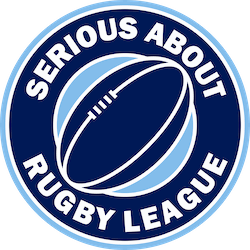
The salary cap was introduced into Super League with the purpose of making sure clubs could share the best talent around, as opposed to the days when Wigan gobbled up all the best and consequently won just about every trophy all the time. It was meant to create a level playing field between ALL clubs, make the game more competitive and engaging, as well as making sure clubs couldn’t overspend on players’ salaries and find themselves in financial difficulties.
Just over a year ago I interviewed one current Super League chairman, who’s club was going through a tug-of-war with Warrington Wolves for the signature of then Salford player Ben Murdoch-Masila. Said chairman told me in no uncertain terms that his club “Wouldn’t be capable of competing with Warrington financially”, subsequently, as we all know, Murdoch-Masila signed for the Wolves. It was a clear case of the haves against the have not’s, exactly the sort of situation that the salary cap was meant to avoid happening.
Unfortunately this seems to be a situation that is becoming more and more prevalent in Super League, when you look at some of the talent that has arrived at certain clubs in recent times, compared to the scraps that other clubs are having to try and satisfy themselves with, it is far from a level playing field.
A look at the recent arrivals at the likes of Warrington Wolves, St. Helens, Leeds Rhinos, Wigan Warriors and, to a slightly lesser extent Hull FC, Castleford Tigers, Wakefield Trinity and Catalans Dragons, gives clear indication of the difference. Names such as Kevin Naiqama, Blake Austin, Frank Pritchard (albeit for one season), Ben Barba, Konrad Hurrell, Lachlan Coote, Trent Merrin, Zak Hardaker, Greg Bird, Pauli Pauli and the future arrival of Gareth Widdop at the Halliwell Jones Stadium just goes to show what I am talking about. While it does all make for a more even competition, it still is clearly a case of certain clubs being able to flex the wealth muscle and pick up players that other clubs can only dream of signing.
The addition of first one and now two marquee players seems to only widen that gap, giving these clubs even more of an advantage that they probably already didn’t need anyway. Since its inception here, only Leeds Rhinos, St. Helens, Wigan Warriors and fallen giant Bradford Bulls have ever won the Grand Final, the only names that can be added to that list, of teams who have won the Challenge Cup are Catalans Dragons, Hull FC, Sheffield Eagles and Warrington Wolves! While it is a lot more competitive since the days of the Wigan domination, it is only slightly more so when it comes to the silverware being handed out.
The other side of the cap was of course meant to protect clubs, to stop them overspending on salaries, and stop them going out of business. Not long ago Bradford Bulls were regular trophy winners, as alluded to earlier, they had it all, great players, huge crowds etc. Then they went into administration with huge debts and went out of business, before the club was reformed in the third tier. A recent case of a previously very successful club going into administration is that of Widnes Vikings of course. Another club who suffered financial hardship in the time of the salary cap was 1998 Challenge Cup winners Sheffield Eagles, who had to merge with Huddersfield Giants, before finally having to be effectively reborn.
It is also regularly quoted that the salary cap here is not high enough to compete with the financial muscle of the NRL and rugby union, hence the game being bled dry of all the best talent, or at least in most cases certainly.
I don’t believe it’s time to scrap the salary cap, it needs to be kept in place so sides can have a fair bite of the cherry, but I do believe it needs an overhaul, to make it as fair as possible. Personally I would completely scrap the marquee player rule, there are only a few sides who have adopted it anyway, it clearly doesn’t work and adds absolutely nothing to the game here.

I also think it’s time to restructure how the salary cap is spent. Too much is based around the money men, the club benefactors like Simon Moran, Eammon McManus and previously Dr Marwan Koukash. I suggest clubs should only be able to spend what is realistic from their business income such as merchandising, season pass membership, ticket sales and prize money. As much respect as I have for the benefactors of clubs, what would happen to the likes of Warrington if Moran pulled out, or St. Helens if McManus departed? A few years ago Hull FC were on the brink of collapse for a second time, like during the whole David Lloyd affair, Hull KR were also almost in administration at one point, until Messrs Pearson and Hudgell accordingly invested huge amounts to save them from extinction. While I’m not suggesting that Warrington or Saints would collapse without their current chairmen, I’m sure it would lead to both clubs having to struggle significantly to regain their current places in Super League. It would also probably bring an end to them being able to sign the sort of players they currently, or have recently had on their books.
On the Super League show last Monday, John Kear said that the reason that one of his former clubs Batley Bulldogs are in a decent financial position is because the chairman won’t spend what he hasn’t got, it’s a lesson that every club should learn and stick to!
In cases like Hull FC and formerly financially stricken and relegated Castleford Tigers, these are two clubs who maybe don’t splash the cash as much on big names. There is the occasional big name, but certainly not with the monotonous regularity of Warrington, Leeds and Saints. What they have done, as far as I can see, is work very hard in the background, get their clubs on a very stable financial footing and tasted comparative success. Indeed Castleford are very well known to have said that the marquee player rule doesn’t fit into their club ethos, yet both them and Hull have had a habit of competing with and turning over the best that Super league has to offer in recent years.
Once again, I know other people will have their own opinions, which we are all entitled to, so I look forward to the debate raging on!





























pt
March 4, 2019 at 1:37 pm
There’s so many loop holes how the club’s run there finances, also there was supposed to be in place every club having to allow ongoing inspection of finances, the salary cap has more holes than a trawlers nets, ( Warrington new signing of RU player, not in cap for first 2 years then only 50% of his payments in 3rd year ) then there’s marquee signings,,,,,,,,,,. The parachute payment for relegated clubs is spread throughout the following season, making it impossible to clear previous financial commitments ( the whole point of the parachute monies )
pt
March 4, 2019 at 1:43 pm
I believe Red Hall could do better, they need to get balls like the Aussie League runners, But Red Hall could not arrange a piss up in a……….. add that Super Leagues up its own arse! its no wonder UK RL is like a 3rd / 4th world country.
Dont they realise every time a club goes into administration how much damage it does & feeds the press, ra ra more ammunition to attack RL.
The idea of 12 points deduction for going into Admin’ is well over the top, It just about puts you in automatic relegation, & who in there right mind would sign up & financially back that, Rich nutter, we’ve nutters but sadly not rich!
Make going into Administration a charge of “Putting the game in disrepute” which then results in putting in place “A Finance Amin’ Team” !!!
pt
March 4, 2019 at 1:43 pm
Does anyone who sees and listens to Ralph Rimmer think the RFL is in safe hands?
Every time he’s asked an important, pertinent question, he comes up with It’s not up for discussion at this moment in time.